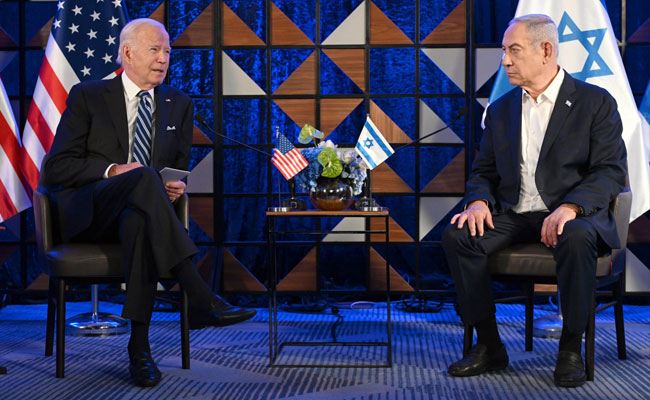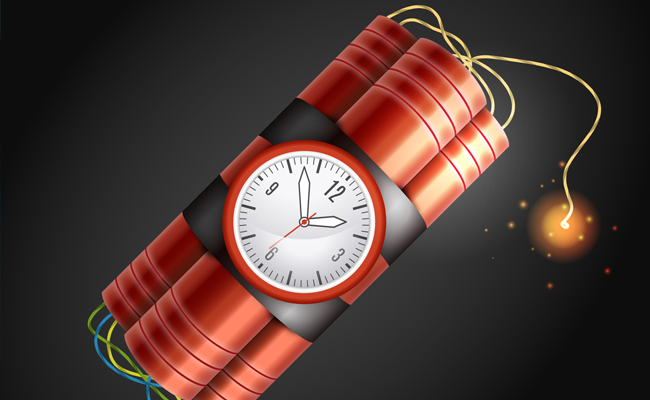Tel Aviv (AP): President Joe Biden opened his visit to Israel on Wednesday vowing to show the world that the US stands in solidarity with the Jewish people and offering an assessment that the deadly explosion at a Gaza Strip hospital appeared to have been carried out "by the other team" and not the Israeli military.
"Based on what I've seen, it appears as though it was done by the other team, not you," Biden told Israeli Prime Minister Benjamin Netanyahu during a meeting, referring to Hamas. But Biden said there were "a lot of people out there" who weren't sure what caused the blast.
The Hamas-run Gaza Health Ministry said an Israeli airstrike caused the destruction and hundreds of deaths. The Israeli military denied involvement and blamed a misfired rocket from the Palestinian Islamic Jihad. However, that organisation also denied the claim.
Biden had been scheduled to visit Jordan after the stop in Israel, but meetings there with Arab leaders were called off after the hospital explosion. He told Netanyahu he was "deeply saddened and outraged" by the explosion. But he also said it was not hyperbole to say Hamas had "slaughtered" Israelis in the October 7 attack.
"Americans are grieving, they really are," Biden said. "Americans are worried."
Netanyahu thanked Biden for coming to Israel, telling him the visit was "deeply, deeply moving."
"I know I speak for all the people of Israel when I say thank you Mr President, thank you for standing with Israel today, tomorrow and always."
Netanyahu met Biden at Ben Gurion Airport and they embraced before speeding away for hours of meetings, where the US president is expected to push for allowing critical humanitarian aid to be delivered to Palestinians in the Gaza Strip.
Israel has been preparing for a potential ground invasion of Gaza in response to Hamas' attacks on October 7, which killed 1,400 Israelis.
John Kirby, a White House national security spokesperson, told reporters aboard Air Force One that Biden "wants to get a sense from the Israelis on the situation on the ground" and will "ask some tough questions."
"He'll be asking them as a friend," Kirby added.
The president also planned to meet Israeli first responders and the families of victims killed and hostages taken when Hamas made its incursion into Israel.
Roughly 2,800 Palestinians have been reported killed by Israeli strikes in Gaza. Another 1,200 people are believed to be buried under the rubble, alive or dead, health authorities said.
Those numbers predate the explosion at the Al-Ahli hospital on Tuesday. No clear cause has been established for the blast.
Protests swept through the region after the blast at the hospital, which had been treating wounded Palestinians and sheltering many more who were seeking a refuge from the fighting.
Hundreds of Palestinians flooded the streets of major West Bank cities including Ramallah. More people joined protests that erupted in Beirut, Lebanon and Amman, Jordan, where an angry crowd gathered outside the Israeli Embassy.
Outrage scuttled Biden's plans to visit Jordan, where King Abdullah II had planned to host meetings with Palestinian President Mahmoud Abbas and Egyptian President Abdel Fattah el-Sissi. But Abbas withdrew in protest, and the summit was subsequently cancelled outright.
Jordan declared three days of mourning after the hospital explosion. Kirby said Biden understood the move was part of a "mutual" decision to call off the Jordan portion of his trip. He said Biden would speak to the Arab leaders by phone as he returned to Washington.
Ayman Safadi, Jordan's foreign minister, told a state-run television network that the war is "pushing the region to the brink."
There are also fears that a new front could erupt along Israel's northern border with Lebanon, where Hezbollah operates. The Iran-backed organization has been skirmishing with Israeli forces.
Always a believer in the power of personal diplomacy, Biden's trip will test the limits of US influence in the Middle East at a volatile time. It's his second trip to a conflict zone this year, after visiting Ukraine in February to show solidarity with the country as it battles a Russian invasion.
The visit to Israel coincides with rising humanitarian concerns in Gaza, where Israel has cut off the flow of food, fuel and water. Mediators have been struggling to break a deadlock over providing supplies to desperate civilians, aid groups and hospitals.
US Secretary of State Antony Blinken, bouncing back and forth between Arab and Israeli leadership ahead of Biden's visit, spent seven and a half hours meeting Monday in Tel Aviv in an effort to broker some kind of aid agreement and emerged with a green light to develop a plan on how aid can enter Gaza and be distributed to civilians.
Although only a modest accomplishment on the surface, US officials stressed that Blinken's talks led to a significant change in Israel's position going in that Gaza would remain cut off from fuel, electricity, water and other essential supplies.
US officials said it has become clear that already limited Arab tolerance of Israel's military operations would evaporate entirely if conditions in Gaza worsened.
Their analysis projected that outright condemnation of Israel by Arab leaders would not only be a boon to Hamas but would likely encourage Iran to step up its anti-Israel activity, adding to fears that a regional conflagration might erupt, according to four officials who spoke to The Associated Press on condition of anonymity to discuss internal administration thinking.
Let the Truth be known. If you read VB and like VB, please be a VB Supporter and Help us deliver the Truth to one and all.
Shivamogga: A 17-year-old student from Kamakshi Street in the city, Prem Kumar, died of drowning while swimming in River Tunga in Pillangiri village of the taluk recently.
Prem, who was studying in II PUC at DVS College, was visiting the temple in Pillangiri with his friends and got into the river for a swim, when he drowned in the waters of the river.
The youngster’s body has been sent to the mortuary of the McGann Hospital in Shivamogga to conduct a post-mortem examination.
Shivamogga Rural Police visited the spot and held an inspection.





_vb_04.jpeg)